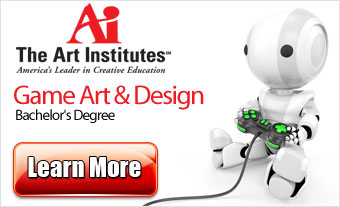
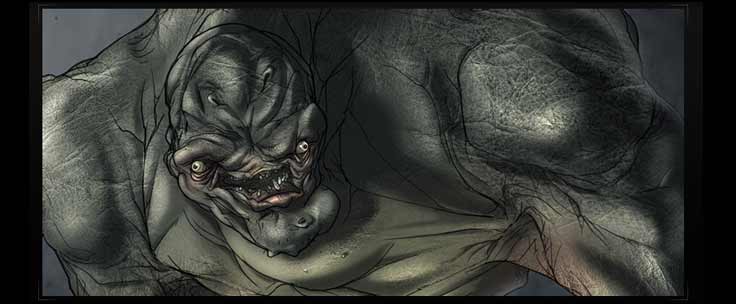
Concept Art
Aaron St. Goddard
//http://www.wildpixels.com/brasshorse/
Tell us about yourself Aaron; where are you from and when and how did you get started drawing concept art?
I'm from Vancouver, British Columbia, Canada. I decided I wanted to do concept art in high school around grade 9 or 10. Basically I watched a lot of movies, such as Jurassic Park, and Aliens. Those films really made me want to design my own characters and creatures so one day I could see them on the big screen.
How serious are you about concept art? Is it a career for you or is it just a hobby?
I'm very serious about concept art as my career choice. I can't think of anything I'd rather do more, so it's a bonus that I can actually make a living off of it.
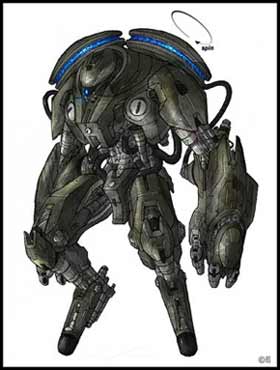
No, I don't animate any of my artwork. I do, however, try to make my designs feasible for animation, whether it's 2D or 3D. Since I have experience with both forms of animation, it helps me to figure out what will work and what won't when I'm designing.
Do you think that artists with a formal education in Illustration have an advantage over self-taught artists?
I think that's true to some degree. Formal education is definitely helpful, as I found out with life drawing. Figure studies and practicing drawing the human form really taught me to loosen up, and was probably the biggest aid towards helping my skills improve. Teachers often have a lot of helpful insight. On the other hand, a lot of my own knowledge is based off self-taught observation of other artwork and designs, as well as nature and other things such as architecture and such.
It's good to teach yourself as much as possible, but definitely important to learn the technical side of art.
What Programs and Hardware do currently work with? And why do you choose to work with these software packages?
I work with natural media (paper, pencils, pens) for all my drawing, and Adobe Photoshop 7 for my coloring. I've used other programs, but Photoshop is definitely the best suited to my style. I've been teaching myself how to paint with Photoshop for the past 3 years, and have grown really familiar with the program. This is good, since I like to work quickly and it saves me a lot of time if I know exactly what I'm doing.
What artists influenced your work and whom do you admire?
Most of the artists who inspire me are fellow designers in the entertainment industry. People such as Mark McCreery, Sam Liu, Mike Yamada, and Feng Zhu create wonderful art which really motivates me to improve. I've had the chance to interact with a few of these people, which is definitely an insightful experience when it comes to learning about how they work.
Where do you get the inspiration for your art?
I find inspiration in a lot of things when I'm designing. The biggest inspiration, though, is definitely movies. Every time I come out of just seeing a big blockbuster film with a lot of cool imagery and design, I get really pumped up about creating some of my own. Other inspirations can be found in other places, such as nature, or even interesting buildings in the city. I've come up with a few fun ideas after watching wildlife shows on television.
Could you take us through your creative process when starting a new project.
Basically I start off with the goal to create something original. Originality is definitely the key word. Even if the basic idea behind the concept isn't very fresh, say, a mech with guns or a barbarian with a sword, I'll try to add some sort of stylistic twist to it, to give it that edge which will set it apart. Often I look into other designs related to what I'm working on, to research what has been done, what works, what doesn't, etc. After that, I'll draw a bunch of rough sketches to practice fleshing out the idea I have in my head. Once I settle on the look of the design, it's just a matter of putting it on paper and getting it done.
How often do you draw?
I try draw almost every day, whether it's a just 5 minute thumbnail doodle, or a completed design.
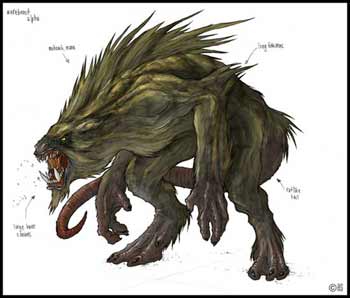
I definitely prefer pencils and paper over any other medium. It's really a lot more hands-on than working with a computer, and I find it really captures the artist's style. That's always a good thing. I've never been a big fan of painting with a brush on paper or canvas, but I do plan on venturing into that direction somewhere down the road. I'm sure I'll have a lot of fun learning new techniques and such.
What's the most technically challenging aspect of your drawing style?
I try to create a level of realism in my designs which will make people think that it really can exist and function in the real world. This is definitely the most challenging part of coming up with a design, since people are so accustomed to knowing what looks right or what looks wrong. Even if the design is outrageously strange, I'll try hard to make it based in some sort of working reality.
What three pieces of your artwork are you most proud of and why?
I'm pretty picky about my own art, so it's difficult to pick any favourites. If I had to name a top three, they would be Bunchies, Godo, and the Scythemaw. Bunchies was just a quick character design I had done at 4am which eventually became insanely popular. It eventually spread all over the internet and I still get mail about it. Godo is a character design I had done for a contest on CGTalk.com, which won me 1st place. I'm still pretty happy with it. Lastly, the Scythemaw is a creature design where I drew out various parts of the life cycle. I like how it turned out, and I think I came up with a pretty cohesive and scary design.
On average how long does it take you to complete a concept?
This can definitely vary. Sometimes I'll spend 2-3 days re-drawing an idea and finding technical problems that take a lot of time to solve. Other times, I'll start a new concept and be finished within 2 hours. It can be a good learning experience when you struggle with a design, but it's definitely satisfying when you can get a lot of good work done quickly. Thankfully, I'm getting quicker everyday.
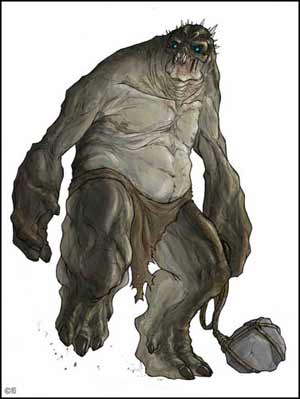
I'd love to work on any big budget action movie, especially one featuring cool monsters. It would be very, very cool to get the chance to work with someone like Stan Winston or Phil Tippett on a project someday. Hopefully I'll get the chance soon.
What's next for Aaron St. Goddard? Are there any new projects on the horizon?
At the moment I'm trying to lean towards getting full-time employment instead of freelance work. Freelance is fun, but I'd definitely like to work with a team of people on a cool project.
Do you have any advice for the aspiring artist out there?
>There's a few important things to know. One of the most important things is to get your name out there. Make contacts. If you want people to know who you are, post your work on forums and advertise your website/portfolio if you have one. Also, be open to critique. The best way to improve is to find out what you may be doing wrong, and fixing it. Other artists can help you out a great deal. Lastly, draw as often as you can, and focus on making a diverse portfolio. It'll pay off in the end.
Thanks to Aaron St. Goddard (http://www.wildpixels.com/brasshorse/) for agreeing to answer the questions we had for him.



